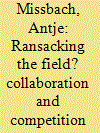| Srl | Item |
| 1 |
ID:
132054


|
|
|
|
|
| Publication |
2014.
|
| Summary/Abstract |
Natural disasters have become a heightened security issue in the last decade. Mitigating and responding to disasters, such as the 2004 tsunami in Southeast Asia and the 2011 earthquake in Japan, reflect a new security agenda that has spread across the globe and infiltrated most regional organizations. At first glance, the creation of regional programmes on disaster risk management (DRM) appears to be driven by the functional preferences of states. However, a comparison of ten regional organizations reveals some curious ambiguities. Despite different threat perceptions, financial budgets and geographical environments of regional organizations, a majority of states have formed DRM programmes that exhibit highly standardized features in terms of language, the referent points of protection and the apparent motivations for cooperation. World society theory is used to explain these striking similarities with reference to the global cultural system. This article also illustrates the analytical purchase of world society theory in understanding cooperation through regional organizations.
|
|
|
|
|
|
|
|
|
|
|
|
|
|
|
|
| 2 |
ID:
106351


|
|
|
|
|
| Publication |
2011.
|
| Summary/Abstract |
After the end of almost thirty years of armed conflict in 2005 and following a devastating tsunami in 2004, Aceh has become a "social laboratory" for foreign researchers who study Indonesia's northern-most province from every angle. Over the last five years, this effort has resulted in the publication of a considerable number of articles in major journals. For some foreign researchers, Aceh became a fast track accelerating their careers. Yet, how much did local Acehnese researchers benefit from being at the center of this scholarly attention, and how much were they able to participate in academic debates? To answer these questions, this article examines the involvement of Acehnese scholars in the process of knowledge production in and about contemporary Aceh. One of the key findings is that local researchers are often involved in data collection, but left out from its analysis and interpretation due to a general lack of structural conditions for publishing, such as under-funding, lack of access to major academic literature, and language barriers. Embedding this inquiry about research cooperation and competition in wider debates about representation and academic development support, this article stresses critical evaluations of current academic ventures. Moreover, Aceh as a post-conflict/tsunami site illustrates the enormous difficulties that developing countries such as Indonesia face in tertiary education and academic research. Long-standing structural imbalances responsible for uneven research outcomes cannot disappear overnight or only as a result of foreign educational initiatives. Nevertheless, this article introduces a specific example of short-term academic collaboration named Aceh Research Training Institute (ARTI)-a flicker of hope in an otherwise rather unpromising situation.
|
|
|
|
|
|
|
|
|
|
|
|
|
|
|
|
| 3 |
ID:
106895


|
|
|